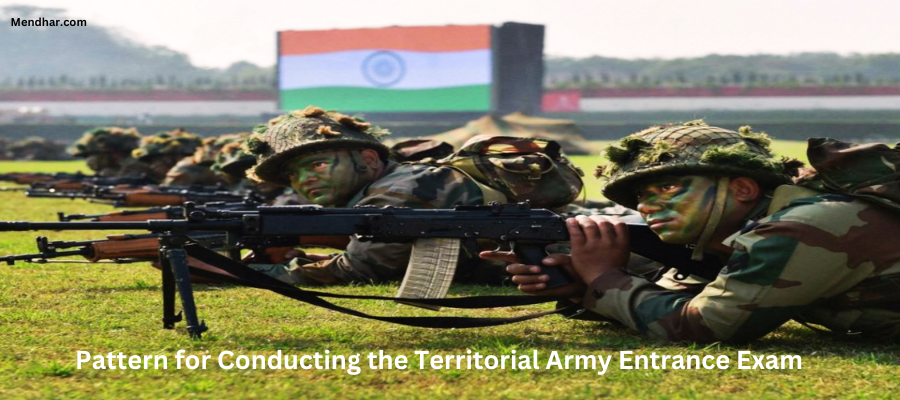Table of Contents
TogglePattern for Conducting the Territorial Army Entrance Exam

The Territorial Army Entrance Exam is a prestigious gateway for individuals aspiring to serve as part-time Territorial Army officers. This exam evaluates candidates across a range of subjects to test their reasoning, general knowledge, mathematics, and English language skills. Here, we break down the Territorial Army Entrance Exam pattern and provide insight into its structure, syllabus, and important guidelines.
Exam Structure
The Territorial Army Entrance Exam consists of four main sections, each designed to assess a different skill set. Below is a detailed table of the exam pattern.
| Paper | Subject | Time Allotted | Number of Questions | Marks |
|---|---|---|---|---|
| Part-1 | Reasoning | 2 Hours (total) | 25 | 25 |
| Part-2 | Elementary Mathematics | 25 | 25 | |
| Part-3 | General Knowledge | 25 | 25 | |
| Part-4 | English | 25 | 25 | |
| TOTAL | 100 | 100 |
- Type of Exam: The Territorial Army Entrance Exam is a computer-based test (CBT).
- Language: The test is available in both English and Hindi, allowing candidates flexibility.
- Qualifying Marks: The qualifying marks are decided by the Territorial Army Directorate and may vary each year.
- Negative Marking: Each incorrect answer results in a penalty of one-third of the assigned marks (0.33%). Additionally, questions marked for review at the end will be counted as unanswered, impacting the final score.
Objection Management: To ensure transparency, the Territorial Army Directorate provides an objection management process. A link to raise objections regarding any question or answer key will be available on the Directorate General Territorial Army (DG TA) website 72 hours after the examination ends. Candidates will receive this link via their registered email, and it will be accessible for three days.
Syllabus for the Territorial Army Entrance Exam
Each section of the Territorial Army Entrance Exam syllabus is uniquely designed to assess candidates’ abilities in core areas essential for Territorial Army officers.
Part 1: Reasoning
This section tests candidates’ ability to solve logical and analytical problems. The questions cover sequences involving numbers, statements, figures, and letters, requiring candidates to identify patterns and draw logical conclusions. Mastery in reasoning is crucial as it reflects the candidate’s problem-solving approach in complex scenarios.
Part 2: Elementary Mathematics
Arithmetic
- This area includes natural numbers, integers, rational numbers, real numbers, and basic operations like addition, subtraction, multiplication, and division.
- Key topics include square roots, decimal fractions, time and distance, time and work, percentages, interest (simple and compound), profit and loss, and ratio and proportion.
- Elementary Number Theory: Candidates should be familiar with H.C.F. and L.C.M., along with understanding logarithmic operations.
Algebra
- Algebraic fundamentals cover basic operations, the remainder theorem, H.C.F., L.C.M., and solving quadratic equations.
- Candidates should be proficient in set language, rational expressions, and laws of indices.
Trigonometry
- This includes trigonometric functions such as sine, cosine, and tangent, specifically for angles like 0°, 30°, 45°, 60°, and 90°.
- Questions may also involve basic trigonometric identities and their application in height and distance problems.
Geometry
- Geometry questions cover lines, angles, theorems on triangles and parallelograms, and properties of circles. Candidates should be familiar with fundamental theorems and geometrical properties.
Mensuration
- Mensuration involves calculating the area and volume of shapes like triangles, quadrilaterals, parallelograms, and circles, along with 3D shapes like spheres.
Statistics
- This section focuses on data interpretation, including graphs (such as frequency polygons and histograms) and central tendency measures like mean, median, and mode.
Part 3: General Knowledge
The General Knowledge section covers current events, historical insights, geographical knowledge, and basic scientific observations relevant to the everyday environment. Candidates should stay updated on national and international events, prominent historical events, and general scientific awareness, as these are commonly tested topics.
Part 4: English
This section evaluates candidates’ command over the English language. The focus is on vocabulary, grammar, comprehension, and effective usage of English in everyday communication. Reading comprehension passages, synonyms, antonyms, and sentence correction are some typical question formats.
Eligibility and Conduct Guidelines
Eligibility Verification: While admit cards are issued to registered candidates, final eligibility verification is conducted after the initial rounds. Simply possessing an admit card does not confirm eligibility, which will be reviewed based on official documentation after clearing the preliminary exams.
Unfair Means: The use of unfair means is strictly prohibited in the Territorial Army Entrance Exam. Any candidate found using unauthorized aids or indulging in dishonest practices will face immediate disqualification. Invigilators are instructed to note cases where candidates refuse to acknowledge any discrepancies. Maintaining exam integrity is crucial, and candidates are encouraged to approach the exam with honesty.
Mobile Phones and Electronic Devices: The use of mobile phones, smartwatches, and other electronic communication devices is strictly banned at all exam venues. Candidates are advised not to bring valuables to the exam venue, as the Directorate will not be responsible for any loss of personal items.
Final Preparation Tips for the Territorial Army Entrance Exam
To succeed in the Territorial Army Entrance Exam, candidates should focus on understanding the exam pattern and preparing comprehensively according to the syllabus. Here are some preparation tips:
Reasoning Practice: Regularly practice reasoning questions from previous papers or sample exams to build quick analytical skills.
Mathematics Foundation: Strengthen fundamental math concepts, especially arithmetic, algebra, and trigonometry, as they form a substantial part of the syllabus.
Stay Updated for GK: For the General Knowledge section, keep abreast of current events and refresh basic history and geography knowledge.
English Proficiency: Read newspapers and practice comprehension and grammar exercises to improve English language skills.
Mock Tests and Time Management: Regularly attempt mock tests to improve time management and get familiar with the CBT format.
The Territorial Army Entrance Exam provides a robust opportunity for candidates aspiring to serve the country in a part-time military role. Candidates should prepare well to ensure they meet the required qualifying marks and demonstrate the skills essential for a Territorial Army role.


